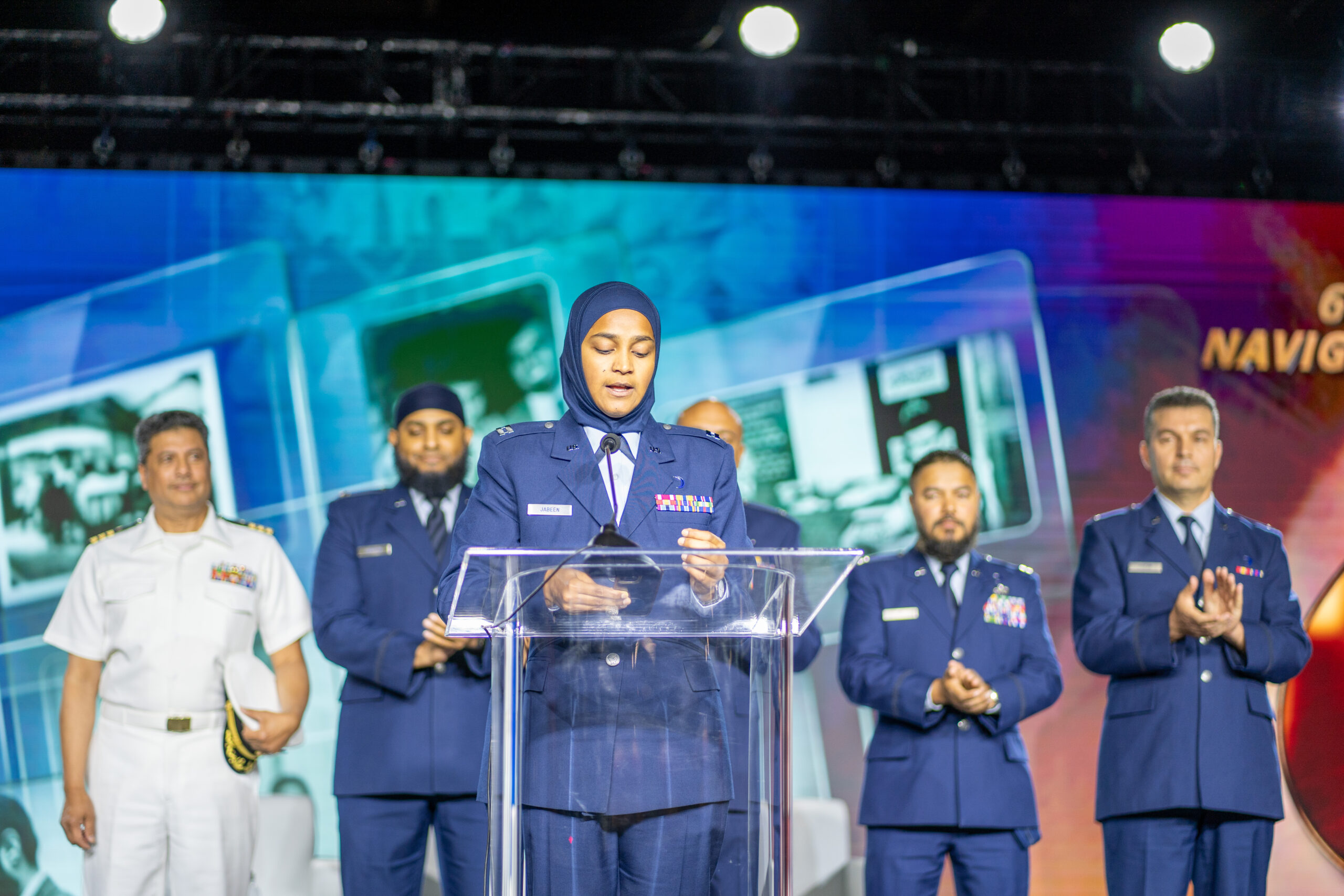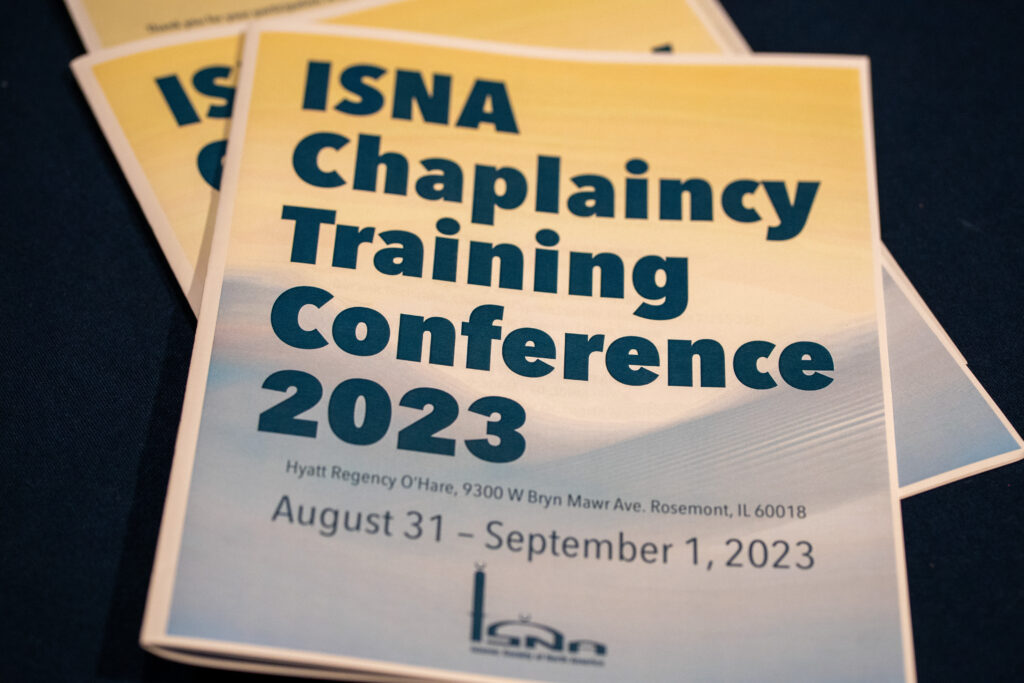Muslim Chaplains Provide Healing and Support in Various Settings
By Yerusalem Work
Jan/Feb 2024

“We live in a mostly secular world that may have lost its connection to the divine,” said Tahira Wellman, a chaplain at New Jersey’s Hackensack University Medical Center. She’s the only Muslim chaplain in its pastoral care department.
Yahya Hendi, the first full-time Muslim chaplain at an American university, was hired in 1999 by Georgetown University. Due to its small Muslim student population, Hendi, who was chosen to enlighten non-Muslims about Islam, has focused on the interfaith community.
Muslim chaplains work in hospitals, universities, prisons, and many other settings. Mutahhir Sabree (administrator, the Distance Learning Prison Initiative) works to provide free courses in Islamic Studies to inmates nationwide. Interacting with more than 3,000 male and female inmates, he teaches and prays with them, as well as encourages them to identify with the prophets of Islam and the multitude of spiritual stories in the Quran, such as the lives of prophets Yusuf and Ayyub.
The challenges believers face aren’t unprecedented, for “Verily, with hardship comes ease” (94:5). Success is within reach with the proper attitude and a concerted effort. Our goal is to set forth the right intentions and attain the results that will please God.
Muslim chaplains enter the profession from a variety of routes. Some pursue a seminary degree; others travel to the Middle East and North Africa for a deep dive into Arabic studies and to obtain authentic traditional knowledge of the Quran and Sunna. Some begin as volunteers, while others are trained in pastoral care. Whatever the route, these individuals can play a vital role in the lives of knowledge seekers — both beginners and advanced.
Muslim chaplains must not only have a robust knowledge of Islam, but also be aware of developments in today’s philosophical discourse, including the arts and sciences. The postmodernism taught in universities can deter many Muslims — plagued with doubt — from practicing their faith. Objectivity is considered a myth, and subjectivity is exalted. Speculation as well as free association replace order with chaos. Even third-wave feminism disrupts the intellectual pursuits of Muslim feminists, for feminism looks different in Islam than it does in opposing ideologies. Muslim thinkers can take the reins and offer practical solutions for navigating one’s way through the world in a way that is compatible with Islam.
Joshua Salaam (president, Association of Muslim Chaplains) has traveled the world performing with the popular nasheed singers of Native Deen. Currently a chaplain at Duke University, armed with a Doctor of Ministry from Hartford Seminary (now the Hartford International University for Religion and Peace), has studied Christian-Muslim dialogue in depth on the graduate school level.
“Chaplaincy is a nice blend of art and science,” Salaam said. “Chaplains who receive official training in pastoral education learn the art of listening without the presence of their own biases. This allows the chaplain to get the individuals where they want to go instead of where the chaplain thinks they should be. Mastering this tool is an art. But the tools themselves are a science.”
We have so much to learn from his vantage point.
Chaplaincy Challenges
Like other fields of work, chaplaincy also has its challenges. Since a chaplain is forbidden to proselytize, even when Chaplain Wellman believes a non-Muslim patient would benefit from Islamic teachings, she cannot initiate such a conversation. Instead, she extends psycho-spiritual support and tries her best to embody prophetic character in her interaction with patients, as “a sort of silent da‘wa.”
Wellman has helped clients overcome the fear of shame when navigating a culture in which families don’t speak out about hardships. In one case involving a wife being her husband’s sole caregiver, Wellman enabled her to vocalize her fear and burden while improving her self-care approach and help-seeking behavior. The solution often comes from the client, because the chaplain simply facilitates the treatment by providing a safe space for exploring the client’s need, moving from survival to self-actualization.
Wellman also helped disentangle a client from the cycle of abuse imposed by a Muslim, which was distancing her from Islam. Many times an abusive relationship causes a person’s faith to plummet. However, due to Islam’s virtues and God’s mercy, she modeled a mirroring exercise that helps people imagine a world without harsh human judgment and abuse of power.
Ultimately, she believes a person’s connection with God is what really brings about change. A chaplain can advise, but it is truly Allah subhanahu wa ta‘ala who guides,” she said.
The ISNA Chaplaincy Program

ISNA’s active chaplaincy program is dedicated to offering services to Muslim chaplains through endorsement, education and training, and leadership development. This program endorses chaplains serving in the Army, Air Force, Navy, prisons, hospitals, universities and other institutions. ISNA honors them by qualifying them to offer care, spiritual guidance, support families in times of grief and loss, ensure religious freedom and offer similar services.
One of this profession’s foremost benefits is the privilege of representing Islam in mainstream American society. As an ambassador for Islam and a professional chaplain, you’ll have the opportunity to share and exchange your Islamic life experiences with colleagues from multiple faith or even non-faith backgrounds in a very collegial and non-threatening manner.
In addition to either performing or providing religious services, as well as attending to their clients’ other spiritual or pastoral care needs, Muslim chaplains are responsible for organizing and conducting all Islamic religious services (e.g., the Friday, funeral and Eid prayers). Held to high standards, they abide by strict ethical considerations (e.g., privacy and freedom from discrimination based on age, ethnicity, gender or disability) and follow the Prophet’s (salla Allahu ‘alayhi wa sallam) conduct. They listen without bias to clients facing grief, worries, fears and other pivotal, life-changing pressures. Counseling may be one-on-one or occur in groups –large or small.
While the annual salary for an entry-level Muslim chaplain is, on average, approximately $45,000, military chaplains often make significantly more — an average of $90,000 per year. If you’re interested in becoming a chaplain, complete the application process on ISNA’s website (isna.net/chaplaincy-services), undergo a background check and abide by the Muslim Chaplain Code of Ethics.
Yerusalem Work, a creative writer and the membership director of the Congregational Library Association, has a heart for interfaith dialogue and is a passionate community builder. A holder of a master’s degree in library science and prolific author, she regularly blogs and self-publishes her writing. Her short stories and poetry have been published in Muslim Matters and Tysons Interfaith. She considers it an honor and a pleasure to write on Islamic themes.
Tell us what you thought by joining our Facebook community. You can also send comments and story pitches to horizons@isna.net. Islamic Horizons does not publish unsolicited material.
